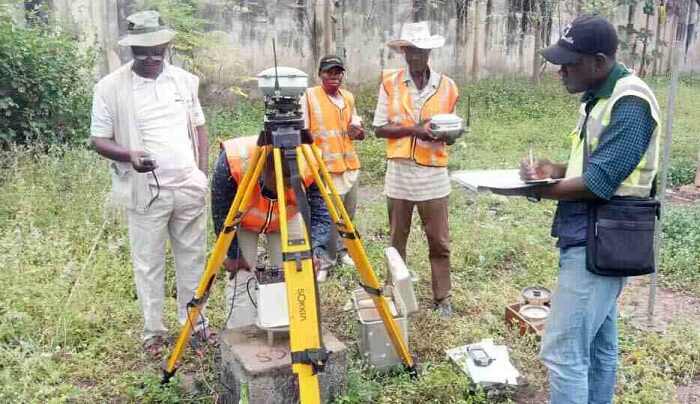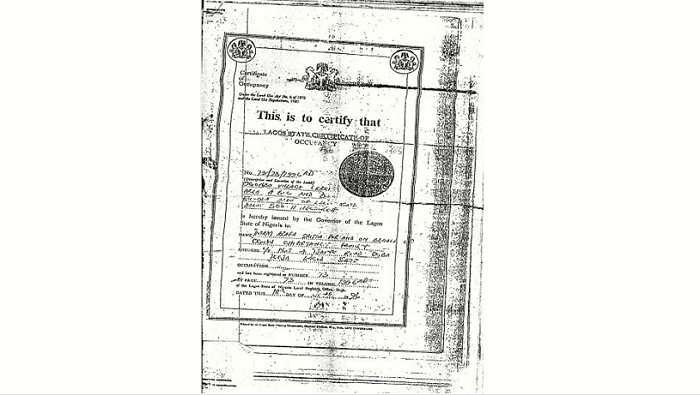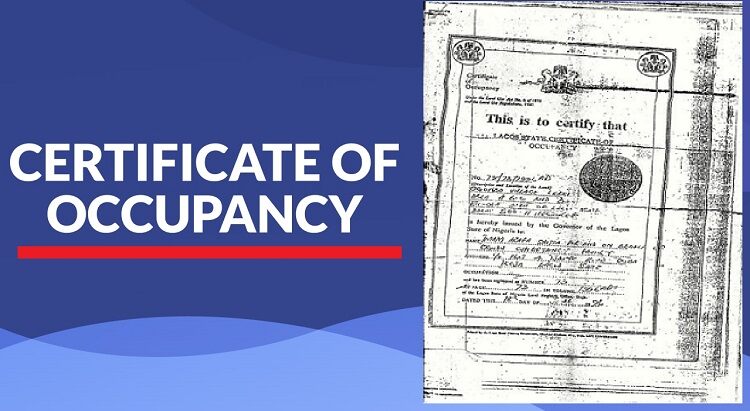In Nigeria, the Certificate of Occupancy, or C of O, is one of the most important document to property buyers and landowners. According to the Land Use Act 1978, all lands in each state of the nation are controlled by the Governor of the state.
What is certificate of occupancy?
A Certificate of Occupancy is a document issued by the state government to property buyers or landowners as legal proof of land ownership in Nigeria for residential, commercial, or agricultural purposes. Without a C of O, your land or property can be taken over at any time without due compensation. C of O is very important as it would be needed when starting property development, converting the use of the property or transfer of ownership of a property.
This document is presented to land owners who are in possession of a piece of land before 1979. C of O’s are only issued to the first person to purchase the land and cannot be issued again. An Individual who acquires land through a sale does not need a new certificate of occupancy, instead, a deed of assignment with Governor’s consent.
Content of a C of O:
- Certificate of Occupancy number
- File number
- Plot number
- Location details
- Plot size
- Survey plan or graphic (plot shape)
- Date of issue
- Lease term
- Initial annual ground rent fees
- Land use purpose
- Terms and conditions
Importance of having a certificate of occupancy
Proof of ownership: this document serves as proof of ownership of a property. This means that it provides the holder with legal protection against any dispute or wrongful claim on the property.
Access to loans: most financial institutions require a C of O if you’re using your property as collateral to access loans. This is because the C of O serves as an evidence that the property truly belongs to you and it was legally acquired. Property owners with a genuine C of O can therefore leverage their property to secure access to loans.
Protects property value: In most big cities across the nation, a property with a C of O usually has a higher resale value than one without. For properties without, it could decrease the value or make it difficult to sell.
Ease of transfer: this document makes it easier to transfer ownership of a property. This results in a simpler and easier process for buying or selling real estate.
Possibilities for development: it enables the property’s owner to develop it without worrying about possible legal implications. This implies that the owner is able to develop the property, including the ability to access services, utilities, and other advantages.
Ensures safety and compliance: it establishes that a building or structure complies with local building rules and safety laws, confirming that it is suitable for habitation and ensuring safety. Additionally, it aids in avoiding any risks and problems that may result from building violations.
How Much Does C of O cost in Nigeria?
The cost of obtaining a C of O varies by state. The certificate of occupancy charge is determined by the city in which the plot is located. Obtaining a Certificate of Occupancy in Lagos or Abuja is a little more expensive than in other states.
In places like Abuja, Lagos , Osun, Delta , the Certificate of Occupancy is calculated based on square meter of land .In Lagos, the cost is linked to the actual Fair Market Value (FMV) of the land you intend to acquire.
Difference between right of occupancy and certificate of occupancy
The main difference between the Certificate of Occupancy and right of occupancy is that a Right of Occupancy (R of O) document is basically an offer to a said plot of land, not the official ownership rights of the land while a Certificate of Occupancy (C of O) is the better recognized official right of ownership over the parcel of land.
The R of O is actually a good title, but weaker than C of O because the R of O’s rights can be revoked without compensation, but in most cases, compensation is granted to owners of a C of O.

How to get certificate of occupancy in Nigeria
You can get a Certificate of Occupancy through the department responsible for land matters in your state.
However, who you buy land or property from determines how you will get your C of O.
You must first verify that the land or property you are about to pay for has not been acquired by the government if you are buying from Indegenes, also known as “Omo Onile“
The state government is another entity with the authority to sell you land.The procedure of getting your C of O would be quick and easy if you were buying directly from the government because it would be started as soon as the sale was confirmed.

Oyo state
You can get your C of O in Oyo state via an online application. You’ll need an application fee of ₦10,000, passport photographs, land agreement, receipt, picture of property, affidavit (where applicable), registered survey plan, CAC registration document and company stamp (for commercial properties). Once your application is received, your C of O will be delivered in 60 days.
The cost of C of O in Oyo state is ₦150,000 – ₦400,000 for residential land, ₦250,000 – ₦400,000 for commercial land and ₦200,000 -₦750,000 for Agricultural land.
Ogun state
Ogun State land administration and revenue management system (OLARMS) handles the C of O on land not owned via Government allocation. Application and payment is made on their website .You are required to pay: ₦10,000 for application fee, ₦50,000 for processing fee and once full payments and required information has been received, your document would be processed within 30 days. You would be contacted to collect your C of O in person.
Ondo State
To get your C of O in Ondo state, you can visit either the Ministry of lands and housing, Ministry of physical and urban planning or the Ondo state internal revenue service office. The application form is ₦6,000 and you’re to come with all important documents including a valid means of identification, land use charge receipt of the current year, survey , receipts , passport and other document relevant to the ownership of the property.
The processing cost for a bungalow and one floor building is ₦150,000, ₦200,000 for 2 floor building and ₦225,000 for a 3-floor building. More information can be found on the Ondo State revenue service website.
Kaduna
The Kaduna Geographic Information Service (KADGIS) has the authority to issue Certificates of Occupancy (C of O) for land registration. To register land with KADGIS, follow these steps:
- Obtain the application form from KADGIS Customer Service Centre or their website.
- Fill out the form and gather original land documents, along with photocopies.
- Provide valid photo identification (e.g., passport, national ID card).
- Submit the completed form and documents, paying the processing fee at the Service Centre or designated bank account.
- Receive an Acknowledgment Letter confirming application receipt and processing initiation.
- Optionally, you can appoint a representative for the task
Your application will undergo verification, including land plot and documentation. If approved, you’ll receive an approval or Offer Letter; fulfill requirements and settle bills. Once ready, you’ll be notified to collect your C of Oor Registration document from the Kaduna service centre through the KADGIS Call centre.
Plateau
Here are the steps to register your property and obtain a certificate of occupancy in Plateau State:
- Get and fill the Statutory right of Occupancy form from the Customer Service Unit at the Ministry of Lands, Survey and Town Planning in Jos, Plateau State, or download the form from the website.
- Lodge your application, which can take up to 5 days.
- Pay the processing fees, which takes 3 days.
- Survey checks and confirmations, typically taking 1 day.
- Town planning analysis and approvals, about 2 days.
- Your application will be reviewed, and provisional rights will be granted within 3 days.
- Accept the granted rights and pay the ground rent within a 3-day period.
- Prepare and review the Title Deeds Print, which takes around 2 days.
- Generate and obtain approval for the Certificate of Occupancy (C of O) within 5 days.
- Register and receive the C of O, which can take between 0 to 5 days for completion
Akwa Ibom
AKwa Ibom geographic information management system is in charge of issuing C of O in the state.To get your C of O in the state, you need the following documents:
- C-of-O application form ₦10,000 application fee and ₦15,000 preparation fees
- Passport photograph
- Current tax clearance (for 3 years) or tax exemption
- Application for Letter of Consent addressed to Executive Secretary Land Use and Allocation Committee.
- Original survey plan
- Registered power of Attorney
For private land,
- applicant submits required documents to Land Use and Allocation Committee.
- Applications are published for public awareness and objections.
- Town Planners inspect plots to ensure validity and location.
- Successful applications are sent for Approval-in-Principle by the Governor.
- Approved applications are processed at the Ministry of Lands and Water Resources.
- Certificates are prepared, executed by the Governor, and returned for stamping.
- Stamped certificates are registered at the Deeds Registry. Certificates have a specific duration, can be nullified if fraudulently obtained.
For Government Land:
- Applicant submits necessary documents to Ministry of Lands and Water Resources.
- Certificates are prepared, executed by the Governor, and returned for stamping.
- Stamped certificates are registered at the Deeds Registry. Certificates have a specific duration, can be nullified if fraudulently obtained.
- Duration: Online – 2 weeks, Manual – 2 to 3 months.
Delta state
Land Registration Process for Statutory Right of Occupancy (SC of O) in Delta state:
- Application and Assessment: Present survey plan at Fasttrack Desk, Ministry of Lands and Surveys in Asaba.
- Obtain application form based on land type (private or government).
- Make payment based on assessment (varies by size, location, and purpose).
- Submit electronic teller to obtain an acknowledgment receipt.
- Return completed form with required documents to Fasttrack Delta ICT Center or Ministry of Lands and Surveys in Asaba.
- Include passport photo, means of identification, title documents, survey plan, survey lodgment certificate, tax clearance, stamped deed of assignment, stamp duty receipt, and other documents.
- Document Clearance: Vetted documents will receive clearance within 48 hours.
- Publication: Successful applications are published in the Pointer newspaper for public awareness and possible objections. A waiting period of 21 days follows.
- Physical Inspection: Applications without objections undergo physical inspection by the Surveyor General and Department of Town Planning. Inspection reports are generated within 5 working days.
- Final Assessment and Payment: Applications proceed to Secretary Land Use and Allocation Committee for final assessment (premium) and issuance of offer letter.Accept the offer and pay final assessment and ground rent (prorated for the period).
- Submit electronic teller for acknowledgment receipt.
- Registration and Collection: Corporate applicants register at the Deed Registrar’s office with company seal. Individual applications are registered and forwarded to the Director of Lands. Certificates of Occupancy are ready for collection after payment clearance.
- Certificate Collection: Applicants with fully registered and cleared C of Os are notified by phone to collect from the Director of Lands’ office.
Abuja
To apply for and obtain a Certificate of Occupancy (C of O) in the Federal Capital Territory (FCT) Abuja, Nigeria:
1.Gather required documents: The following documents are typically required during the application process:
a. Application letter addressed to the Director of Development Control Department, Abuja Metropolitan Management Council (AMMC), requesting a Certificate of Occupancy.
b. Completed application form obtained from the Development Control Department.
c. Proof of ownership in the form of Deed of Assignment, Certificate of Right of Occupancy, or other legally recognized documents.
d. Survey plan of the property
e. Architectural drawings
g. Where applicable, an Environmental Impact Assessment (EIA) report.
h. Proof of payment of all applicable fees and charges.
3. Submit the application: Once you have gathered all the necessary documents, submit the application together with the supporting documents to the Development Control Department of the Abuja Metropolitan Management Council (AMMC). Make copies of all documents for your records.
4. Verification and inspection: After submitting the application, the development control department will examine and verify the property to make sure it complies with building codes, zoning regulations, and other relevant guidelines. This may involve physical inspections and document reviews.
5. Processing and approval: If the property meets all the conditions, the application will be processed by the relevant department or committee.
6.Fees: If your application is approved, you will be required to pay the mandatory fees, which may include development fees, infrastructure fees, and any other applicable charges. The relevant department will notify you of the precise fees and payment process.
7. Issuance of certificate of occupancy: The Certificate of Occupancy will be issued to you after you have made the necessary payments.
Ebonyi
You can obtain the statutory right of application form for either private individuals or corporate at the ministry of land and survey, Abakaliki
All application forms are free. Fill out the form accurately and leave no section empty or unanswered.
Applicants are expected to come with the following documents for application for co of o
- personal data form
- details of previous registration
- original survey plan
- Photocopy of document (Power of Attorney, deed of conveyance, agreement etc)
- current tax clearance certificate
- Recent passport photograph
The survey unit of the ministry of land and survey would examine the survey plan an as provided by the applicant to ensure that it in in order as stipulated in the accepted template.The applicant is required to make payments as stipulated below:
For Private individual ₦116,000 + Ground rent (determined by the size of land )
For private corporate ₦136,00 + Ground rent (determined by size of land)
For government owned ₦150,000 + survey + premium + ground rent
Lagos
Lagos property owners can obtain the Certificate of occupancy form from lands bureau office, Alausa, Ikeja. The application form is ₦10,000.00 for general land and ₦20,000.00 for prime land. Details on the procedure and fair market valuation can be found here
You will need to have the following documents:
- Formal letter addressed to the executive secretary – land use and allocation committee,
- completed certificate of occupancy form with receipt
- land information certificate with receipt.
- Survey plan
- Passport photograph with white background.
- Sketch map of the site
- Stamped purchase receipt
- Proof of payment of income tax
- current development levy
- Publication fee – ₦10,000.00
- capital contribution fee subject to a minimum of ₦30,000.00
- Building plan approval (if developed).
- Copy of tenement rate receipt (if occupied).
Procedure
- Submission of form and documents
- Payment of assessment fees
- Publication of names
- Property inspection
- Processing of C of O i.e recommendation for execution by the committee
- Registration and collection


1 thought on “Certificate of Occupancy: All You Need to Know”